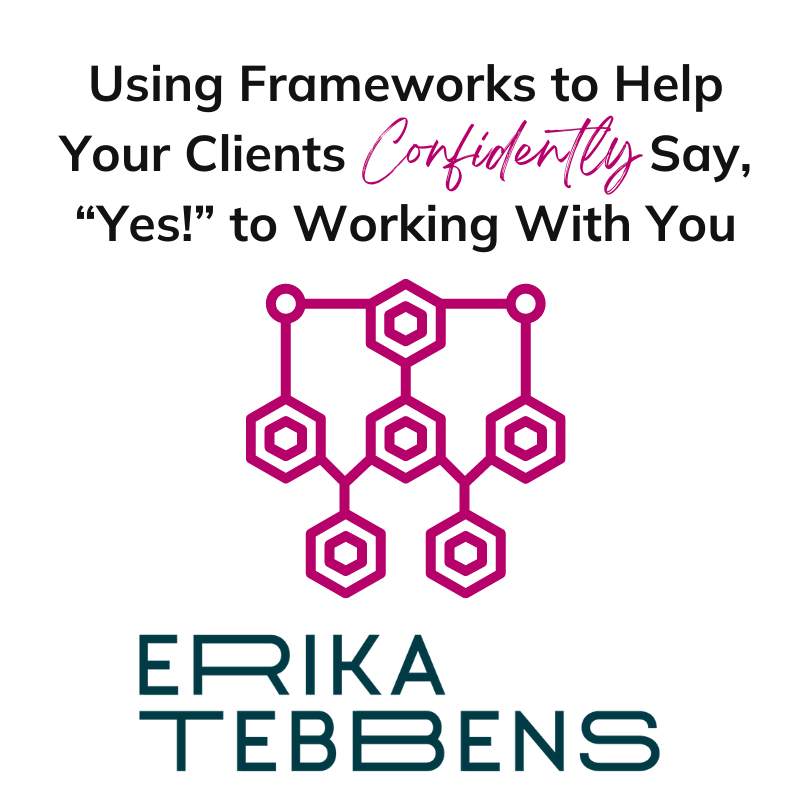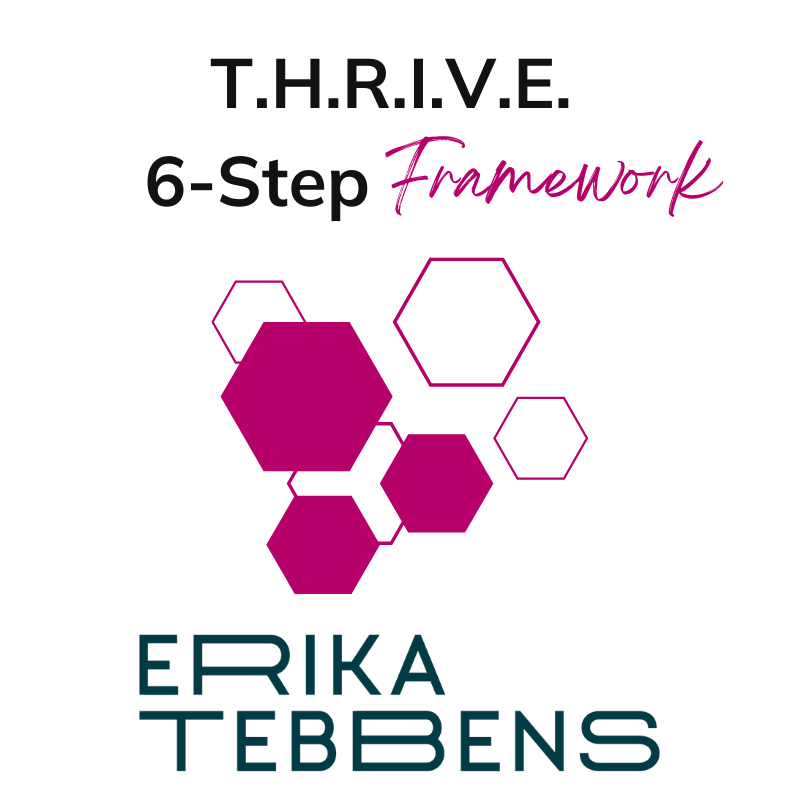Want a customized growth plan?
Exploring why it’s time to be seen as an authority in your field & how your innovative approach to your work can be leveraged for sustainable success.
Frameworks: using them for your business might sound complicated, confusing, heavy, or even boring, but I promise it doesn’t have to be that way!
Frameworks are just a really great way to succinctly convey information about what your business offers to your potential clients.
Since 2020, there’s been a lot of talk online amongst entrepreneurs about making statements that could be seen as political, or standing in solidarity with something that’s viewed as political.
That might be something that’s caused you to wonder… What’s appropriate? Does it just cause further division? Should I even be saying anything? What if I say something and it causes further harm?
Keeping on top of your business’s finances tends to be one of those tasks that, for most of us, we just don’t want to do.
I know for me, for a very very long time, I just wanted to stick my head in the sand and hope things worked out come tax time.
So trust me. If you feel overwhelmed, or even scared, of your business’s finances, I totally get it.
Trying to think about how to reach more perfect-fit potential clients can feel like staring at a blank screen when you have a huge essay to write. It’s daunting.
Like, where do you even begin? Who are these potential people? Where are they? Should you join a new social media platform? Which podcast should you pitch? Should you pitch to speak in other formats, like summits or events? It feels like there are more questions than answers and like you'll never be able to actually make any headway.
Launch burnout is something that so many online entrepreneurs experience that it’s started to feel like it’s just unavoidable, part of the package when it comes to launching.
You know what I mean.
During your launch, you work work work non-stop, put all your energy into the launch, and by the end of it, you’re soooo exhausted that you need at least a week to recover before you can do anything (let alone deliver the offer you just sold!).
There’s a trend in the online business world, especially among business coaches, of bragging about having a $10k month.
And I once learned that a lot of the times, those income claims that are being made are actually not totally true, because it doesn’t necessarily mean cash in hand in that month (which is a rant for a different blog post).
There’s a trend I’ve noticed in the online business coaching world that has been rubbing me the wrong way, and it needs to be talked about.
I’m talking about Boss Babe culture and the lack of integrity I see in a lot of the marketing and messaging happening there.
Because for me, integrity is one of my top values, and a lack of integrity just isn’t how I do or teach business.
It’s really important to build not just a successful business, but a thriving business.
I talk a lot about living your truth in your business. Or about prioritizing rest and not glorifying productivity.
These are actually just two parts of my six-part thriving business framework that I use with my clients to help them build a business that works for them.
For service-based business owners, there comes a point where you’re bringing in consistent revenue… but you want to level things up.
You’re ready to scale your business and grow your revenue further, but you don’t want to triple your rates to the point that most of your audience can’t afford to work with you, and you don’t want to work more hours than you already are.
You may have heard that beta offers are a great way to create and launch a new product or service, and it’s true!
“Beta” just means the first version of a new offer you’re putting out into the world while you test it out. Think of it as a trial run. It’s the perfect opportunity to see how an offer is resonating with your audience so that you can help solve a problem your clients are experiencing, bring in revenue, and test a new concept.
There’s a lot of one-size-fits-all solutions out there in the online business world. And I’ve got a problem with that.
So many “business gurus” teach and sell whatever it is that they’re offering as something that will work for everyone and anyone, exactly as is, cookie-cutter style.
But that’s just not true.
We often waste a lot of time building out every facet of an offer before we go to sell it, and this is a great way to drive yourself bananas. If you want to launch something new, just create whatever your clients or customers need right away, and build out the rest as you go.
It seems scary, especially if you're a perfectionist, but it means you get to start helping people, and getting paid for it, sooner. Plus, you can even pre-launch a new offer to gauge interest and have people ready to go when the doors open.
I had a big revelation recently. It involves food insecurity, $1 hamburgers, and all of the ways that we, as business owners who care about changing the world, try to right the wrongs of capitalism and end up almost destroying ourselves.
If you’ve ever felt an obligation to offer your work at the lowest price possible so as many people as possible can benefit, then this post is for you.
Do you ever find yourself thinking, “Who, me? Oh, I’m not a leader”? That’s true for a lot of the people I work with, too – they wouldn’t self-identify as leaders. But they (and you!) are.
How do I know? Because you’re probably someone who regularly reflects on your values and considers whether you’re really living into them.
In the online business world, sometimes you hear people talking about how creating a course means easy passive income and making money in your sleep.
But the thing is, most of the people talking about courses that way are trying to sell you on their course about making courses…
When you’re trying to build a business that works for you, it’s important to make sure that you’re creating the right types of offers that will get you to your revenue goals in a way that actually works for you.
So it’s important to understand the difference between high-ticket and low-ticket offers.
If you are somebody who is pretty full with client work, looking to scale, and you just aren't sure what that right next offer is, this is the post for you.
There are pretty much limitless amounts of new offers you could create as a business owner. But generally speaking, we can condense them down to five things.
As entrepreneurs, we often get caught up in ideas about what we should be doing.
Sometimes, all it takes is reading somebody's Facebook post, and suddenly your brain is just spiraling out and you think, “I'm not going to be successful if I don't do that.”
But the reality is that not everyone needs to have a podcast, a monthly membership site, a group program, a free Facebook group, and do challenges and webinars!
It’s important to make sure that when you create a new offer, it’s a total “hell yes!” for you, as well as for your clients.
These are the kinds of offers that will get you to your goals without burning out along the way (because spending all your time and energy delivering offers that you’re not super jazzed about is a huge slog).
I’m all about having a business that sustains you, and being able to live your life and enjoy it rather than feeling like your work is sucking out your soul.
As we forge our way into a new year, I’ve been doing some reflecting on the past – specifically why I started my own business. So let’s take it back to the beginning.
And maybe you’ll find inspiration for the future, like I did.
I am such a dork for planning. I love it. I love planning stuff.
But I do my business planning a little differently than I've seen some people do it.
Let me guess. As a woman running your own business, managing your to-do list is a huge source of frustration. It never seems to end, and it’s so hard to get everything done without sacrificing all your free time.
But it’s totally possible to manage a neverending to-do list without working 24/7.
If you’ve followed along with me for any amount of time now, you know that I am all about earning more revenue in fewer working hours -- and that I am so not here for hustle culture or anything that promotes burnout.
It's completely unnecessary. It's a harmful way of thinking. It’s not sustainable in the long term.
You should be able to have a business that you love.
When you're ambitious, when you're high achieving, when you're a real go-getter, it can be very, very easy to slip into a pattern where you equate your worthiness with how much work you are getting done.
And I know that when I talk to my clients, there is a fear that if you step away, it’ll be worse when you come back. Or that you’ll lose the chance to do business with someone.
It’s really important for me to teach women how to grow their business so that it’s kind of burnout proof. To me, that means being able to take time off and 1) don't backslide in your progress and 2) avoid burnout.
To this end, I'm all about sustainable growth over the long term, rather than a boom and bust cycle, because that's not fun. I've been there and I will just tell you that if you haven't experienced it already, it sucks as bad as you can imagine.
For some people, planning can feel awesome. But for a lot of us, “goals” and “plans” can feel very constricting and anxiety producing.
And I think that a lot of that stems from the fact that broadly, we have a way of goal setting and work planning that is not always the most helpful for all people.
If you’re really over the whole idea of “hustle culture” — i.e. always having to set these astronomically terrifyingly huge goals and then chase after them like a maniac during the year, to the point that you feel super stressed out and unfulfilled and disappointed — it can be hard to know what goals you should set for yourself.
But it doesn’t have to be like that!
There are lots of different ways you can set goals for yourself!
With resolutions, people are either like, “Yay, resolutions!” or they're like, “Oh, screw resolutions.” And I think a lot of the time, it's because we view resolutions as “going to the gym” at the New Year when everyone else also shows up for two weeks and then quits.
It sort of feels like, if I make a resolution, I'm just setting myself up for failure. So why even bother, right? But I think there's a better way. Instead of resolutions, I would encourage you to think of setting goals.
Have you ever had a conversation with somebody about potentially working together, or even collaborating together, and then all of a sudden it's radio silence? And you think to yourself, “are they ghosting me?” If so, this post is for you. It can feel really weird when you are having a conversation with somebody and all of a sudden you aren’t hearing from them anymore — including in business.





























